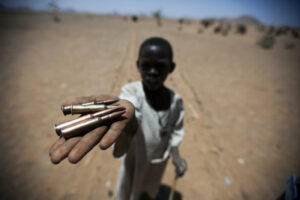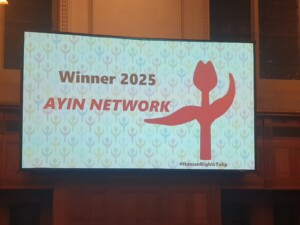“Sudanese authorities continue to harass and make it difficult for journalists to do their work in Sudan,” according to African Center for Justice and Peace Studies (ACJPS) in a statement yesterday, which also celebrated the Sudanese Journalists Association (SJA) electing 40 new members last month.
ACJPS has documented several incidents where Sudanese authorities have interfered with the exercise of media freedom and free expression this month, including attacking or judicially harassing journalists whilst they are working.
In one such incident, on September 13, police forces distracted two Sudanese journalists from covering the Marches of the Millions in Khartoum. Hussein Hennery “was obstructed using a tear gas canister that was thrown at him while he was covering the rally,” forcing him to leave the area. Amira Saleh “was held by police in Khartoum with batons. She was later released on the same day after the rally had ended and no charges were placed against her.”
Ibrahim Nugdallah, a professional photographer, was charged with Public Noise and disturbance of Public Peace and photography of Military areas under articles 77, 69 and 57 Sudanese Penal Act, 1991. His case “was dismissed on September 12 because of an absence of complaints.” The court ordered that the officers return Nugdallah’s cameras that were confiscated during his arrest.
ACJPS also documented the judicial harassment of Seifeldin Adam Ahmed “who was detained, tortured and charged with defamation over a social media post” on September 10. In addition, Radio FM 100 broadcast in Khartoum banned Aayah El Sabag from her radio show for seven days for hosting three members of the SJA on September 7.
ACJPS called for taking advantage of the transitional period “to make comprehensive institutional and legislative reforms and raise awareness on the international conventions and disseminate the culture of human rights violations and impunity implanted by the former regime.” The organisation explained that “reform does not mean duplicating policies of the former regime, but rather creating a strategic reform process.”
Despite continued harassment and censorship of journalists in the country, the ACJPS statement celebrated the election of 39 new members of the SJA’s secretariat on August 29. The electoral committee headed by Feisal Mohamed Saleh, the former Minister of Culture and Media announced the results of the election last month. Abdelmonim Abu Idris, who works for Agence France-Presse (AFP), was democratically chosen as the new chair.
The ACJPS statement noted that the reform of the SJA has been fought for by acting association chair, Sabah Mohamed Adam, a journalist and human rights defender along with other members since 2020.
“They reviewed the record lists of Sudanese Journalist and developed a regulation for the association so as to delete the names included during the past regime because of their affiliation with the now dissolved National Congress Party of ousted President Omar Al Bashir. Many of the names were people in public service and other institutes like regular forces. It’s the great work made by the primary association that led to the peaceful and successful election despite the attempts by the affiliates of the NCP to ruin the process by claiming some positions.”
 Sudanese Journalists Association elections in Khartoum on August 27 (social media)
Sudanese Journalists Association elections in Khartoum on August 27 (social media)











 and then
and then